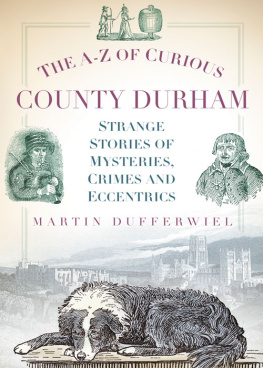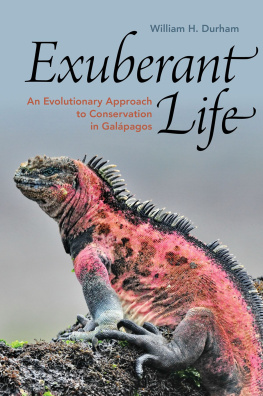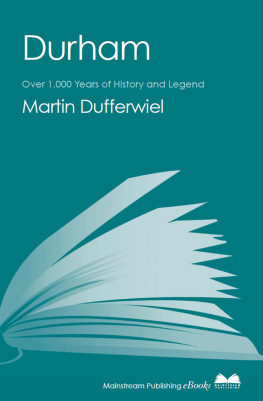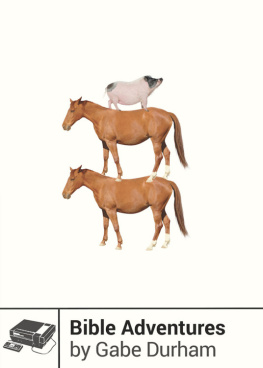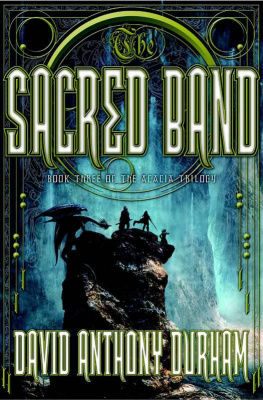David Durham - The other lands
Here you can read online David Durham - The other lands full text of the book (entire story) in english for free. Download pdf and epub, get meaning, cover and reviews about this ebook. genre: Romance novel. Description of the work, (preface) as well as reviews are available. Best literature library LitArk.com created for fans of good reading and offers a wide selection of genres:
Romance novel
Science fiction
Adventure
Detective
Science
History
Home and family
Prose
Art
Politics
Computer
Non-fiction
Religion
Business
Children
Humor
Choose a favorite category and find really read worthwhile books. Enjoy immersion in the world of imagination, feel the emotions of the characters or learn something new for yourself, make an fascinating discovery.
- Book:The other lands
- Author:
- Genre:
- Rating:4 / 5
- Favourites:Add to favourites
- Your mark:
- 80
- 1
- 2
- 3
- 4
- 5
The other lands: summary, description and annotation
We offer to read an annotation, description, summary or preface (depends on what the author of the book "The other lands" wrote himself). If you haven't found the necessary information about the book — write in the comments, we will try to find it.
David Durham: author's other books
Who wrote The other lands? Find out the surname, the name of the author of the book and a list of all author's works by series.
The other lands — read online for free the complete book (whole text) full work
Below is the text of the book, divided by pages. System saving the place of the last page read, allows you to conveniently read the book "The other lands" online for free, without having to search again every time where you left off. Put a bookmark, and you can go to the page where you finished reading at any time.
Font size:
Interval:
Bookmark:
David Anthony Durham
The other lands
The Story So Far As related in Acacia, the first book of the trilogy Thasren Mein, an assassin, journeys from the far north. He is the youngest brother of Hanish Mein, chieftain of the exiled northern people from which they take their surname. Thasren bears with him the anger of a defeated people, and he carries a weapon meant to strike at the heart of the ruling Acacian Empire and to announce a long-planned war.
As Thasren moves south into the milder climate of the central empire, the family he is targeting lives an idyllic life, oblivious of the danger creeping toward them. The Akarans, led by King Leodan, have lived for generations at the center of a prosperous empire. The land has been relatively peaceful for years, although the nation's early rise was the result of chaotic warfare. It had been mythologized in tales of the first king, Edifus, his son, Tinhadin, and the legendary band of sorcerers, the Santoth, who were supposed to have helped them win power.
King Leodan rules from the beautiful isle of Acacia, at the center of an inland sea. He is a widower who dotes on his four children: Aliver, a headstrong boy of sixteen; Corinn, the family beauty; Mena, an insightful adolescent; and nine-year-old Dariel, a boy with an adventuresome spirit. Leodan knows that the empire is held together by a number of long-standing crimes. In addition to keeping an iron military grip on the provinces, for years the Acacians have traded with faraway foreigners known as the Lothan Aklun. A naval trading conglomerate, the League of Vessels, handles all the details, so that the two sides never interact. The Acacians send a regular quota of children into some unknown slavery, receiving riches and a drug called mist in return. The empire then distributes mist among the populace, keeping them dull and obedient.
Leodan shelters his children from this, wanting them to have happy childhoods full of love. But in his solitary moments Leodan temporarily forgets his guilt over the empire's crimes-and his longing for his dead wife-by inhaling mist himself.
The king's closest friend and confidant, his chancellor, Thaddeus Clegg, was raised with Leodan. Thaddeus has a secret, one that has turned him against his old friend. He has recently learned-with Hanish Mein's scheming assistance-that the Akaran family was responsible for the death of his beloved wife and infant child years earlier. It was not a crime Leodan had any part in, but learning of it bitterly twists Thaddeus against the king. When a soldier arrives to warn the king of troop movements in the far north, Thaddeus kills the messenger, thereby buying his distant ally Hanish crucial time to unleash his surprise attack.
And what a multipronged attack it is! Thasren stabs King Leodan with a poisoned blade during a banquet. Hanish's other brother, Maeander, leads one army sweeping down from the northwest. To the northeast an alien race, the Numrek, fight savagely on the Mein side. All around the Known World, Meinish soldiers conscripted into the Acacian army rebel. Hanish himself drags a navy across the frozen tundra so that he can launch the boats on spring-flooded rivers and appear suddenly in the Inner Sea, in the heart of the Acacian Empire. In addition to all this, Hanish unleashes a contagion that sends the vulnerable Acacians into writhing agony. And he slaughters them without mercy.
Caught off guard by the sudden fury of the attack, Acacian authority collapses. On his deathbed, Leodan calls on his old friend Thaddeus to enact a plan they had discussed years earlier. Despite everything, Thaddeus agrees. His love of the children is too great for him to hand them over to Hanish Mein. Instead, he sends the children out into the far reaches of the empire, escorted by lone guardians, to be hidden. The hope is that they will grow to maturity in safety and one day reunite and win back the empire.
Very little goes as planned. Only Aliver makes it to his intended destination. He is raised among the Talayan people of the south, in a tribal culture of warriors and hunters, runners who roam the arid plains of their vast continent. He even comes to learn that the mythical sorcerers, the Santoth, are real. He meets them and discovers they would very much like to return from their banishment and aid him but feel their magic has been too corrupted by time. They ask him if he has The Song of Elenet, the text in which the Giver's magical language was written. He does not, so they remain in exile. Aliver grows to manhood in this challenging environment and learns a great many things that build his character and leadership potential. His siblings do not fare quite as well.
Corinn is betrayed by her guardian. She is delivered into Hanish's hands and forced to live among the new Meinish court that has taken over her father's palace. For years she chafes against the luxurious bondage she is kept in, but slowly Hanish's charisma and charm begin to win her over. Much against her will, she falls in love with her captor.
Mena does not reach her planned destination either. Her guardian is killed, leaving her adrift in a small boat at sea. She drifts until she comes ashore on the remote, primitive Vumu Archipelago. There she is greeted as the earthly embodiment of one of the island's main deities, Maeben, the eagle goddess of wrath. Mena is raised in the temple in a position of privilege, although bound by the religion's strict rituals and formalities. For years this is her life, until Melio Sharratt-a childhood friend of Aliver's-discovers her. He assures her that the Akaran story is not over and secretly trains her in sword craft.
When Dariel's guardian cannot find the person he is supposed to deliver the young boy to, he abandons him amid the chaos of human migration happening in the mountain passes of Senival. By chance, the prince is found by Val, a giant of a man whom Dariel had met while exploring the servants' regions of the palace. Val had always told the prince tales of his earlier life as a pirate on the Gray Slopes. He proves the truth of it when he takes Dariel with him, raising the boy as a brigand and sea captain.
Thus the four Akaran children grow to adulthood in vastly different environments, completely out of touch with one another for years. They are brought together through the work of Thaddeus Clegg. The former chancellor, still living with the guilt of having betrayed his king, works among a network of agents to find and bring the Akarans back together.
Hanish Mein steps into the role the Akarans had occupied. He increases the slave quota and continues to suppress the people. It is not long before the varied peoples of the Known World, who had once chafed against Acacian rule, find themselves in even more dire straits under Hanish Mein.
And they don't know the worst of it. One of the early Acacian kings, Tinhadin, had put a curse on them. They are not allowed to pass out of life. Their bodies mummify and they remain trapped in them-not alive, not dead. It was a vindictive act of a mad tyrant, and Tinhadin could not have foreseen that the collective souls of all these Meinish ancestors would band together in a group called the Tunishnevre. They speak to Hanish and demand that they be transported to Acacia for a ceremony that will finally free them back into life with all the power and rage they've gained from centuries as the undead. The ceremony requires elaborate preparation and the blood of one of the Akaran line to succeed.
Aliver begins to rally the vast tribes of Talay. He speaks of a new dawn for the world, with a rule that will be just and fair, with power spread among the various peoples. He swears he will abolish the trade in child slaves, and with the distant help of the Santoth he helps the people defeat the mist addiction that has plagued them for so long. Dariel, fresh from skirmishes with the league, joins him. Mena, having broken with her adoptive religion, reunites with them also. Together, they drive an ever-growing army toward Hanish's forces.
Font size:
Interval:
Bookmark:
Similar books «The other lands»
Look at similar books to The other lands. We have selected literature similar in name and meaning in the hope of providing readers with more options to find new, interesting, not yet read works.
Discussion, reviews of the book The other lands and just readers' own opinions. Leave your comments, write what you think about the work, its meaning or the main characters. Specify what exactly you liked and what you didn't like, and why you think so.



